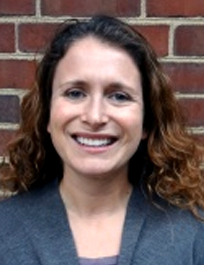Junior Faculty Spotlight: Sarah Suiter
Each month, the CFT Newsletter highlights the work of our Junior Faculty Teaching Fellows. This month, Sarah Suiter, Human and Organizational Development, talks about her teaching philosophy and interests.
 I am faculty in the Human & Organizational Development Department at Peabody College, but my primary teaching responsibilities lie with the Community Development & Action master’s degree program I direct. I am honored to teach CDA students and thoroughly enjoy having a front row seat to their learning and development. They are thoughtful, energetic, and passionate about making the world a better place. In teaching them and other students, I draw heavily on my own experience as a student, and seek to create courses and classroom environments that foster exploration and possibility.
I am faculty in the Human & Organizational Development Department at Peabody College, but my primary teaching responsibilities lie with the Community Development & Action master’s degree program I direct. I am honored to teach CDA students and thoroughly enjoy having a front row seat to their learning and development. They are thoughtful, energetic, and passionate about making the world a better place. In teaching them and other students, I draw heavily on my own experience as a student, and seek to create courses and classroom environments that foster exploration and possibility.
Among the experiences on which I draw are three months spent in the Ecuadorian Andes in 2005, conducting research on an international development initiative that allowed many indigenous Ecuadorians to attend school for the first time. Over the course of the summer, my research partners and I traveled to countless mountain communities and interviewed 198 people about their experiences with the program. Most of the faces and stories of people I interviewed have long since faded into the recesses of my memory, however, the story of one man continues to shape and challenge the way I understand development initiatives specifically, and educational experience generally. When I asked him to describe what it was like to go to school, he told me, “Going to school was the best thing that ever happened to me…It was the best thing that ever happened to me because I met new people, went new places, and learned new things. I experienced a whole new world. But going to school was also the worst thing that ever happened to me – It was the worst thing that ever happened to me because, until I went to school, I never knew that I was…poor.”
Although it is unlikely that students in most university classrooms in the United States would have an experience of education quite this dramatic, my experiences as a student and as an instructor have taught me that the general sentiments often hold true: specifically, education, when well practiced, has the potential to open our minds and lives to the existence and importance of other people, places, and ideas, and that opening can profoundly change us. At the same time, the changes that take place are often uncomfortable, and – sometimes – lead us to realize things about ourselves that we would rather not know. The hope, of course, is that an educational community would also provide each of us with the space, time, and support to process and integrate such knowledge into our lives and self-concepts, and provide us with tools for continued growth. To me, the possibility of such a community is founded on quality teaching that builds on the ideas of students as intellectuals, students as citizens, and students as pioneers.
Students as intellectuals: Leading a classroom of students requires, first and foremost, that I present my class with materials and resources that are theoretically sound, thoroughly researched, and intellectually challenging. I believe that it is my responsibility as a teacher to present such material in creative ways that help students understand both its content and its implications.
Students as citizens: I believe that education should qualify students to pursue various paths after graduation, and prepare them to live as productive citizens. Often, this type of preparation requires helping students to realize and acknowledge their citizenship in the classroom and university community, as well as the communities that lie beyond.
In order to foster citizenship in the classroom, I emphasize that the classroom is a learning community, which implies that we have responsibilities to each other. I also create learning activities that facilitate relationships between students and opportunities for collaboration. When possible, I create structures through which students in my classroom have the opportunity to interact with people outside the university as well.
Students as pioneers: One of my favorite aspects of being a part of a university is the consistent possibility for innovation and discovery. I believe the classroom should be a place where students are encouraged to ask difficult questions, try new ideas, and forge uncharted territory. This is best accomplished when students (and professors) accomplish mastery in traditional theories and methods, and then seek intersections between disciplines and perspectives. In my experience as an instructor, I have been stretched and challenged by students whose astute and creative minds notice connections and contradictions I had not noticed. It is my hope and intention that my classroom is always a place that fosters excellence in learning, responsibility in relationship, and exploration in ideas.

Leave a Response